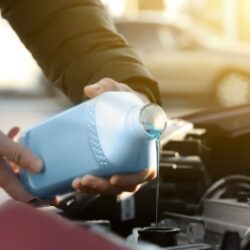Antifreeze pet poisoning risks in Wiltshire
Antifreeze is something that most pet owners living in Wiltshire will have around their house once it comes to winter. However, even the smallest amount can be highly dangerous for your cat. The primary danger comes from ethylene glycol which is toxic to cats.
This substance is highly dangerous for dogs too and can have the same affect.
If you even suspect your pet could have ingested antifreeze then contact Estcourt Vets immediately on 01380 723687.
Why cats like to lick antifreeze
The reason antifreeze is so appealing to cats (and dogs) is the sugary taste. They tend to try and lick it off the driveway and once ingested, ethylene glycol is rapidly absorbed into their bloodstream. Once your cat’s liver metabolises the toxin, the by-products produced, which include oxalate crystals and acids, cause severe damage to the kidneys and other organs. Acute kidney failure in cats due to antifreeze poisoning, can be fatal and painful – prompt treatment is best to provide your pet with the best chance of recovery.
Call our team immediately on 01380 723687.
Symptoms of antifreeze poisoning in cats
All of the symptoms of antifreeze poisoning can occur within 24 – 72 hours of ingestion. Symptoms to look for include:
- Vomiting
- Diarrhoea
- Lethargy
- Loss of coordination
- Seizures
- Signs of kidney failure including increased thirst and urination
If your cat is admitted to Estcourt Vets with suspected antifreeze poisoning, treatments can include induced vomiting, administering activated charcoal and providing intravenous fluids to support kidney function.
Protect your cat
To protect your cats (and dogs), be diligent about keeping antifreeze containers securely closed and stored out of reach. Clean up any spills immediately, and consider using antifreeze products that contain propylene glycol, which is less toxic but still not entirely safe if ingested in large quantities. Contact Estcourt Vets immediately if you are concerned about your pet or if you know they have been exposed to antifreeze.
See our emergency contact information
< Back to articles Estcourt Vets Devizes
Estcourt Vets Devizes